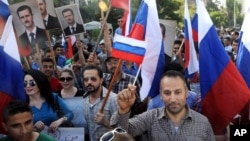While tens of thousands of Syrian refugees continue to flee civil war by traveling to neighboring countries and Europe, Russia is a rare destination despite its Soviet and Cold War ties to Damascus.
According to the U.N. High Commissioner for Refugees, there were 238,836 refugees and asylum-seekers in Russia as of January. But almost all of them, 234,016, fled the fighting in Ukraine, while only 2,340 were from Syria.
Bayisa Wak-Woya, the UNHCR representative for Russia, told VOA that the number had dropped to about 1,600.
“Unlike in the West, where people have a tradition of dealing with asylum-seekers and refugees for the last six, seven decades, here it’s a fairly new phenomenon,” he said. “So, refugees are just [treated like] foreigners and migrants. They don’t see it from a legal-rights point of view.”
Comparatively, Turkey has taken in over 2 million Syrians, while Germany is expected to have as many as 1.5 million asylum-seekers by the end of this year, mainly from Syria, Afghanistan and Iraq.
Radio Free Europe/Radio Liberty reported last month that some 2,000 Syrian Circassians, whose ancestors lived in the North Caucasus before being expelled from the region during the Tsarist Russian wars of conquest in the 19th century, have sought asylum in the Russian republic of Kabardino-Balkaria since Syria's civil war broke out. Estimates of the population of the Circassian community in Syria range from 55,000 to 100,000.
One reason that a relatively small number of Syrians have sought asylum in Russia is the distance between the countries. Moscow is about 2,500 kilometers from Damascus, meaning most Syrian asylum-seekers have to come by plane, not boat, bus or train like those arriving in Europe. Most who look to Russia have connections here, such as friends or relatives who were exchange students during the Soviet era or married into Russian families.
The granting of temporary asylum for Syrians who do make the journey to Russia is common, but refugee status is extremely rare. Only 790 people in Russia had refugee status as of January — and only two were from Syria.
Elena Burtina of the Moscow-based refugee aid group Civic Assistance Committee said Russia's total is lower than that of Malta.
"Russia ratified the convention on refugees,” she said. “It's taken on the responsibility to accept them. Of course it should do more.”
“They shouldn't have signed if they didn't want refugees," she added. "They weren't forced to do it."
Asylum extensions reduced
Burtina said Russian authorities are reducing extensions on asylum periods, forcing many to leave or remain here illegally.
Ahmad Dbbau came to Russia in 2012 to join friends escaping fighting in Aleppo. But he told VOA life was too difficult for Syrians in Russia, so he is planning to leave for Turkey.
“I had temporary asylum status for three months for the review of my case, then it was rejected,” he said.
Dbbau said it's difficult to find work and that Syrians like him are hassled by police to pay bribes for not having the right documents.
"It's very difficult for Syrians here,” he said. “Some people have been living here for three or four years without documents."
Some do not even make it past the border. An Iraqi-Syrian family has been stuck at the Moscow airport since September 10, despite applying for asylum.
Syrian-Kurd Hasan Abdo Ahmad; his wife, Gulistan Shaho; and their four children live in the transit area. Russian authorities accused them of having fake passports, which were seized so they cannot travel. They have been threatened with arrest if they leave the airport.
Shaho, who is originally from Kazakhstan and has a sister in Russia, told VOA that her family was living with "no showers, no clean clothes. The kids are sick, and they [the authorities] tell us, 'This isn't Europe. We won't accept you as refugees.' But where can we go?”
The UNHCR said fewer Syrians are seeking asylum in Russia now than at the beginning of the conflict, when those with close ties to Russia were among the first to flee.
The UNHCR's Wak-Woya acknowledged that Russia’s airstrikes could increase flows of Syrian refugees to its neighbors, such as Turkey, and then on to Europe, but said a jump in the number of asylum-seekers arriving here is unlikely.
“The people who are opposing the regime [of Syrian President Bashar al-Assad], they don’t come here," he said. "They know that this government is not on their side.”




